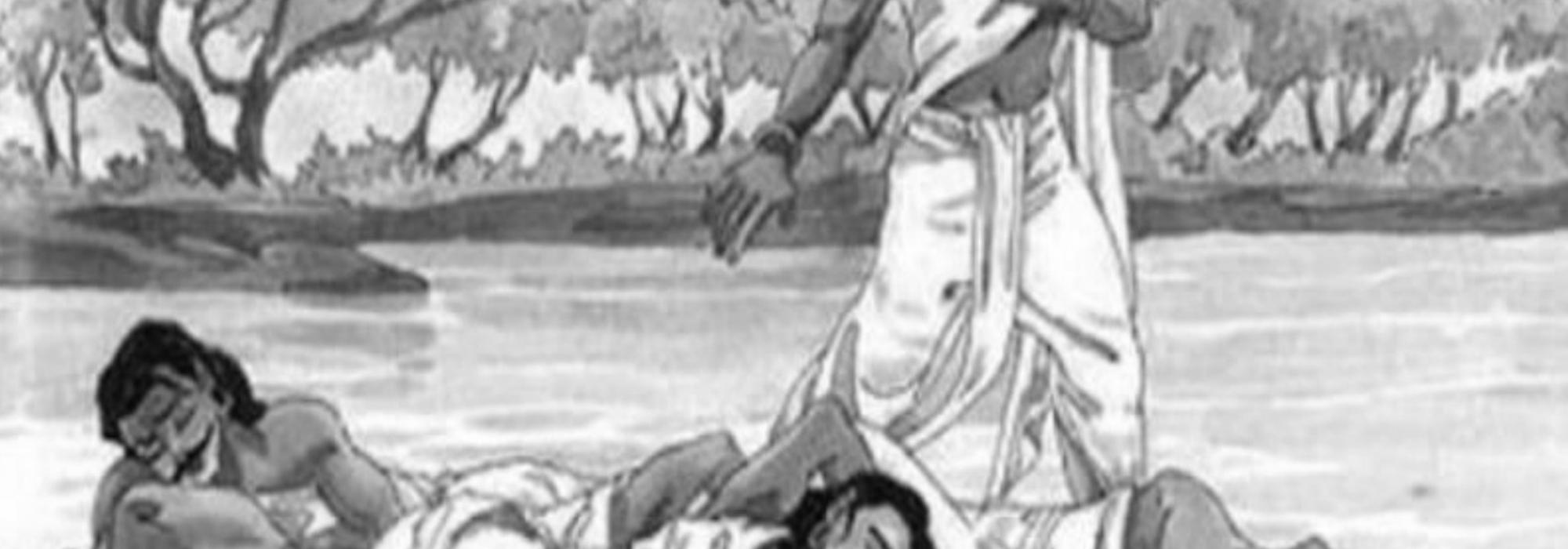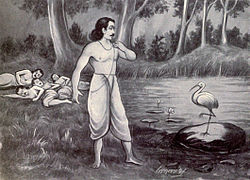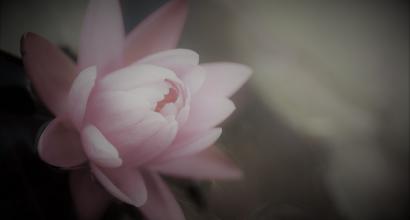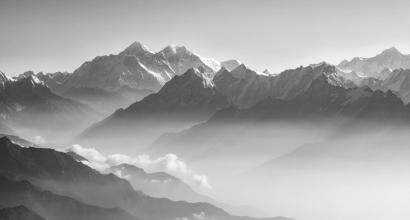One of the most fascinating tales in the Mahabharata is the dialogue between Yudhishtira and Yama on the banks of the enchanted pool. This episode is popularly known as the ‘Yakshaprashna.’ The characters of the Mahabharata, so richly sketched by Vyasa, find relevance even today among readers. Never one to judge his characters or paint them with a single shade of color, Vyasa highlights the ridiculous and the sublime in the characters at various points in the epic. Yudhishtira’s greatest hour is perhaps this: Ravaged by extreme thirst and heart-broken at the sight of his dead brothers, he is put to a test by an enigmatic being. With amazing poise and self-control he responds to every question with a tranquil mind unperturbed by physical and emotional pains. And upon answering every single question correctly, when the demigod grants him the life of one of his brothers, he chooses his step-brother to come back to life in a remarkable gesture of integrity, magnanimity, and empathy.
This episode is spread over two chapters—297 and 298—from the Aranyaka Parva section from the third book of the Mahabharata, Vana Parva. The first three parts of this translation contain shlokas taken from the critical edition (published by Bhandarkar Oriental Research Institute, Pune) while the fourth part has all the shlokas that don’t feature in the critical edition but are a part of the Chitrashala edition (published by Chitrashala Press, Pune).
References
The Mahabharata: Text as Constituted in its Critical Edition. Volume I. Ed. V S Sukhthanker et al. Poona: Bhandarkar Oriental Research Institute, 1971. pp. 794-799.
ಶ್ರೀಮನ್ಮಹಾಭಾರತ. ಸಂಪುಟ ೮. ಸಂಪಾದಕ ಮಂಡಳಿ – ಹೆಚ್ ಎನ್ ರಂಗಸ್ವಾಮಿ ಮತ್ತು ಇತರರು. ಭಾರತ ದರ್ಶನ ಪ್ರಕಾಶನ, ಬೆಂಗಳೂರು. 1975. pp. 4025–4163.
The Mahabharata of Krishna-Dwaipayana Vyasa. Kisari Mohan Ganguli. Book 3: Vana Parva. Sections CCCIX–CCCXII.
Yaksha prashna (from the Chitrashala edition)
Thanks to Dr. Koti Sreekrishna for his comments and edits to the initial version of this translation and to Shashi Kiran B N for his detailed review and insightful feedback.
~
Chapter 297
During their fourteen years of exile, the Pandavas lived in the picturesque Dvaitavana, full of beautiful trees and delicious fruits. Once, as chance would have it, a deer carried away between its antlers the fire-producing sticks (अरणि) of a poor brahmana who was performing the yajna (अग्निहोत्र) that is part of the daily ritual. The brahmana came to the abode of the Pandavas and requested for help. The five brothers took up their arms and went looking for the deer. Even after exhausting all their knowledge in hunting and warfare, they were unable to catch the deer.
Tired, disheartened, and affected by thirst, they approached a banyan tree and spent some quiet moments resting in the cool shade. Nakula climbed the tree and looked for a source of water; finding one, he went in that direction with empty quivers to fill up water. He approached a crystal lake. It was inhabited by cranes. He wished to drink some water to quench his parched throat when he suddenly heard a voice from the sky – “O child, do not commit this rash act! This lake belongs to me. First answer my questions; then drink the water and take away as much as you need.” Nakula was extremely thirsty and he proceeded to drink the cool water, disregarding the faceless voice. The moment the water touched his lips, he dropped down dead.
In succession, Sahadeva, Arjuna, and Bhima came to the lake looking for the previous person, found them lying motionless on the ground, heard the divine words of caution, disregarded it, and fell down dead themselves too.
The worried Yudhishtira decided that he would make the trip himself and came upon the celestial lake. By the side of the lake, Yudhishtira saw his mighty brothers on the ground, felled like logs of wood. He lamented at the cruel game that fate had played on them. Before further investigation about his brothers’ death, Yudhishtira decided to quench his extreme thirst by drinking the water of the lake and he heard the divine voice.
Verses 11-18:
Voice
अहं बकः शैवलमत्स्यभक्षो
मया नीताः प्रेतवशं तवानुजाः ।
त्वं पञ्चमो भविता राजपुत्र
न चेत्प्रश्नान्पृच्छतो व्याकरोषि ॥ ११
I am a crane, feeding on tiny fish in this lake
It is by my power that your brothers have been laid to rest
O son of a king, you shall be the fifth corpse
if you do not answer my questions
मा तात साहसं कार्षीर्-
मम पूर्वपरिग्रहः ।
प्रश्नानुक्त्वा तु कौन्तेय
ततः पिब हरस्व च ॥ १२
Do not act rashly my child!
This lake belongs to me
Answer my questions and then
you can have as much water as you desire!
Yudhishtira
रुद्राणां वा वसूनां वा
मरुतां वा प्रधानभाक् ।
पृच्छामि को भवान्देवो
नैतच्छकुनिना कृतम् ॥ १३
Are you the greatest among the rudras,
the vasus or the maruts?
I ask: Who are you?
This is not the act of a mere bird!
हिमवान्पारियात्रश्च
विन्ध्यो मलय एव च ।
चत्वारः पर्वताः केन
पातिता भुवि तेजसा ॥ १४
Who has caused the downfall of
these four great mountains –
the Himavat, the Pariyatra,
the Vindhya, and the Malaya?
अतीव ते महत्कर्म कृतं बलवतां वर ।
यन्न देवा न गन्धर्वा नासुरा न च राक्षसाः ।
विषहेरन्महायुद्धे कृतं ते तन्महाद्भुतम् ॥ १५
O strong one! You have done a great feat!
You have killed those whom neither
devas nor gandharvas nor asuras nor raskhasas
could defeat in battle; this is a great wonder
न ते जानामि यत्कार्यं
नाभिजानामि काङ्क्षितम् ।
कौतूहलं महज्जातं
साध्वसं चागतं मम ॥ १६
I don’t know your work
nor do I know your purpose
I am extremely curious
and a sudden fright has come over me
येनास्म्युद्विग्नहृदयः
समुत्पन्नशिरोज्वरः ।
पृच्छामि भगवंस्तस्मात्
को भवानिह तिष्ठति ॥ १७
My mind is agitated
My head aches
I ask you, thus, O noble one!
Who are you that stands here?
Yaksha
यक्षोऽहमस्मि भद्रं ते
नास्मि पक्षी जलेचरः ।
मयैते निहताः सर्वे
भ्रातरस्ते महौजसः ॥ १८
Good wishes! I am a yaksha
I am not an aquatic bird
It is because of me that all
your mighty brothers are dead
The rough words that Yudhishtira heard were spoken in a harsh tone. Soon, the Yaksha became visible. He had an enormous mountain-like body and unusual eyes. He was lit up like a brilliant fire. He was seated comfortably on a tree. He roared aloud like thunder.
Verses 22-31:
Yaksha
इमे ते भ्रातरो राजन्
वार्यमाणा मयासकृत् ।
बलात्तोयं जिहीर्षन्तस्-
ततो वै सूदिता मया ॥ २२
O king, these, your brothers,
cautioned by me repeatedly
forcibly took the water
That’s why I killed them
न पेयमुदकं राजन्प्राणानिह परीप्सता ।
पार्थ मा साहसं कार्षीर्म म पूर्वपरिग्रहः ।
प्रश्नानुक्त्वा तु कौन्तेय ततः पिब हरस्व च ॥ २३
One who wishes to live shouldn’t drink this water, O king
Don’t act rashly, O son of Pritha!
This is my lake; answer my questions first,
O son of Kunti, and then drink water freely!
Yudhishtira
नैवाहं कामये यक्ष
तव पूर्वपरिग्रहम् ।
कामं नैतत्प्रशंसन्ति
सन्तो हि पुरुषाः सदा ॥ २४
O Yaksha, I don’t desire for
what belongs to you
Harbouring such desires is
never praised by great people
यदात्मना स्वमात्मानं
प्रशंसेत्पुरुषः प्रभो ।
यथाप्रज्ञं तु ते प्रश्नान्
प्रतिवक्ष्यामि पृच्छ माम् ॥ २५
It is not good to praise
one’s own self, O mighty one
Question me and I will answer
to the best of my ability
Yaksha
किं स्विदादित्यमुन्नयति
के च तस्याभितश्चराः ।
कश्चैनमस्तं नयति
कस्मिंश्च प्रतितिष्ठति ॥ २६
Who makes the sun rise?
Who are those worthy of being in his presence?
Who makes the sun set?
Where does the sun reside?
Yudhishtira
ब्रह्मादित्यमुन्नयति
देवास्तस्याभितश्चराः ।
धर्मश्चास्तं नयति च
सत्ये च प्रतितिष्ठति ॥ २७
Brahman makes the sun rise
Those who move around him are the devas
Dharma makes the sun set
It resides in Satya
Yaksha
केन स्विच्छ्रोत्रियो भवति
केन स्विद्विन्दते महत् ।
केन द्वितीयवान्भवति
राजन्केन च बुद्धिमान् ॥ २८
How does one become learned?
How does one attain greatness?
How does one get a companion?
O king, how does one become intelligent?
Yudhishtira
श्रुतेन श्रोत्रियो भवति
तपसा विन्दते महत् ।
धृत्या द्वितीयवान्भवति
बुद्धिमान्वृद्धसेवया ॥ २९
One becomes learned by listening and study
One attains greatness by tireless efforts
One gets a companion by being courageous
One becomes intelligent by serving elders
Yaksha
किं ब्राह्मणानां देवत्वं
कश्च धर्मः सतामिव ।
कश्चैषां मानुषो भावः
किमेषामसतामिव ॥ ३०
How does a brahmana attain divinity?
What is his true dharma?
What is the human trait of brahmanas?
What is the wrong path for a brahmana?
Yudhishtira
स्वाध्याय एषां देवत्वं
तप एषां सतामिव ।
मरणं मानुषो भावः
परिवादोऽसतामिव ॥ ३१
A brahmana attains divinity by self-study (svadhyaya)
Tapas is the right action for him
Death is the humanly trait of a brahmana
The wrong path is to blame others
To be continued...
















































